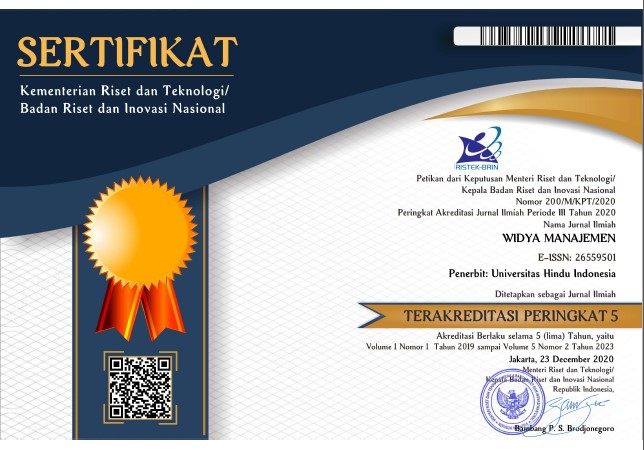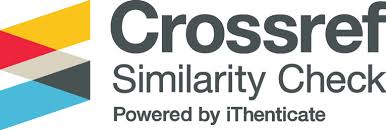Pengaruh Efektivitas Sistem Informasi Akuntansi terhadap Kinerja Individual melalui Motivasi Kerja
Abstract
The digital era certainly has an impact on all levels of society including financial institutions, both banking and non-bank, such as Village Credit Institutions (LPD). LPD is an institution belonging to a traditional village, which can only operate in the area of its traditional village, which refers to the Business Model Canvas. The most important thing to do is to maintain a customer relationship. This study aims to examine the effect of the effectiveness of accounting information systems in increasing work motivation thereby increasing individual performance on LPD. This research was conducted at an LPD located in Mengwi District, Badung Regency. The sample in this study were 114 LPD employees using purposive sampling method. The data analysis technique in this study uses Path Analysis. The results in this study indicate that the effectiveness of accounting information systems has a positive significant effect on employee performance, the effectiveness of accounting information systems has a positive significant effect on work motivation. work motivation has a positive significant effect on individual employee performance and SIA effectiveness has an indirect effect on individual performance through work motivation.
References
Andika, I. G. W., & Sumadi, N. K. (2021). Pengaruh Pemanfaatan Teknologi Informasi, Pelatihan dan Efektivitas Sistem Informasi Akuntansi Terhadap Kinerja Individu pada Lembaga Perkreditan Desa (LPD) di Kabupaten Badung. Hita Akuntansi Dan Keuangan, 1(7), 423–435.
Antasari, K. C., & Yaniartha, P. D. (2015). Pengaruh Efektivitas Sistem Informasi Akuntansi Dan Penggunaan Teknologi Informasi Pada Kinerja Individual Dengan Kepuasan Kerja Sebagai Variabel Pemoderasi. E-Journal Akuntansi Universitas Udayana, 10(2), 354–369.
Arianto, N., & Kurniawan, H. (2020). Pengaruh Motivasi dan Lingkungan Kerja Terhadap Kinerja Karyawan. Jurnal Ilmiah, Manajemen Sumber Daya Manusia, 3(3), 312–321.
Ariputra, W. K., & Suaryana, I. G. N. A. (2018). Budaya Organisasi Memoderasi Pengaruh Efektivitas Penerapan SIA dan Kesesuaian Tugas Dengan TI Terhapada Kinerja Karyawan. E-Jurnal Akuntansi Univeristas Udayana, 22(1), 216–244. https://ojs.unud.ac.id/index.php/Akuntansi/article/view/31659
Astuti, N. M. M. P., & Dharmadiaksa, I. B. (2014). Pengaruh Efektivitas Penerapan SIA, Pemanfaatan, dan Kesesuaian Tugas Pada Kinerja Karyawan. E-Jurnal Akuntansi Univeristas Udayana, 7(3), 747–753.
Caniago, A., & Sudarmi, W. (2021). Analisis Pengaruh Kepercayaan Dan Motivasi Karyawan Terhadap Kinerja Perusahaan. Jurnal Lentera Bisnis, 10(1), 1–13. https://doi.org/10.34127/jrlab.v10i1.404
Dewi, L. P. R., & Dharmadiaksa, I. B. (2019). Pengaruh Efektivitas SIA, Kecanggihan Teknologi Informasi, dan Kemampuan Teknik Pemakai SIA pada Kinerja Individu. E-Jurnal Akuntansi Univeristas Udayana, 27(3), 1735–1762. https://doi.org/10.24843/eja.2019.v27.i03.p04
Farhah, A., Ahiri, J., & Ilham, M. (2020). Pengaruh Motivasi Kerja dan Disiplin Kerja Terhadap Kinerja Karyawan. Jurnal Online Program Studi Pendidikan Ekonomi, 5(1), 1–7. https://doi.org/10.36709/jopspe.v5i1.13326
Lusri, L., & Siagian, H. (2017). Pengaruh motivasi kerja terhadap kinerja karyawan melalui kepuasan kerja sebagai variabel mediasi pada karyawan PT. Borwita citra prima Surabaya. Agora, 5(1), 2–8. https://media.neliti.com/media/publications/54167-ID-pengaruh-motivasi-kerja-terhadap-kinerja.pdf
Murtiyoko, H. (2019). Pengaruh kompensasi dan motivasi kerja terhadap kinerja karyawaN (Studi Kasus di PT. Lautan Otsuka Chemical). JIMF (Jurnal Ilmiah Manajemen Forkamma), 2(1), 105–116. https://doi.org/10.32493/frkm.v2i1.3417
Neely, M. P., & Cook, J. S. (2011). Fifteen years of data and information quality literature: Developing a research agenda for accounting. Journal of Information Systems, 25(1), 79–108. https://doi.org/10.2308/jis.2011.25.1.79
Ochoti, G. N., Maronga, E., Muathe, S., Nyabwanga, R. N., & Ronoh, P. K. (2012). Factors Influencing Employee Performance Appraisal System : A Case of the Ministry of State for Provincial Administration & Internal Security , Kenya. International Journal of Business and Social Science, 3(20), 37–46.
Orocomna, C., Tumbel, T. M., & Asaloei, S. I. (2018). Pengaruh Motivasi Kerja Terhadap Kinerja Karyawan Pada PT. TASPEN (Persero) Cabang Manado. Jurnal Administrasi Bisnis, 7(1), 66–72.
Permana, S. D. H. (2019). Analisis Hasil Improvisasi SEO dengan Metode Hybrid Modified MCDM untuk Peningkatan Peringkat Dan Trafik Kunjungan Website UMKM. Jurnal Sisfokom (Sistem Informasi Dan Komputer), 8(1), 85. https://doi.org/10.32736/sisfokom.v8i1.611
Prariadena, C. H., & Putra, I. M. P. D. (2019). Pengaruh Efektivitas Sistem Informasi Akuntansi pada Kinerja Karyawan dengan Insentif dan Motivasi Kerja sebagai Pemoderasi. E-Jurnal Akuntansi Universitas Udayana, 27(3), 2376–2405.
Putra, I. K. A. M., & Putra, I. M. P. D. (2016). Pengaruh Efektivitas Penggunaan, Kepercayaan, Keahlian Pengguna, Dan Kualitas Sistem Informasi Akuntansi Terhadap Kinerja Karyawan. E-Jurnal Akuntansi Universitas Udayana, 17(2), 1516–1545.
Soudani, S. N. (2012). The Usefulness of an Accounting Information System for Effective Organizational Performance. International Journal of Economics and Finance, 4(5), 136–145. https://doi.org/10.5539/ijef.v4n5p136
Yasin, M., & Mahfudiyanto. (2018). Pengaruh Pelatihan dan Motivasi kerja terhadap Kinerja Karyawan Pabrik Gula Pesanteren Baru Kediri. Bima: Journal of Business and Innovation Management, 1(1), 1–16.
Reproduction Policy
Every author submitting articles to Widya Manajemen must make a statement that the manuscript is free from plagiarism and is not being considered and published in other journals.
Articles that have been published are copyrighted by the Program Studi Manajemen FEBP UNHI. For educational purposes, the contents of the article may be duplicated or reproduced as long as the source of the article is mentioned. Written requests must be submitted to the editor to obtain permission to republish the contents of the article for purposes other than educational purposes.
-----------------------------------------------------------------------------------------------------
Kebijakan Reproduksi
Setiap penulis yang menyerahkan artikel ke Widya Manajemen harus membuat surat pernyataan bahwa naskahnya bebas dari plagiarisme dan tidak sedang dipertimbangkan dan dimuat dalam jurnal lain.
Artikel yang telah dipublikasi menjadi hak cipta Program Studi Manajemen FEBP UNHI. Untuk tujuan edukatif, isi dari artikel dapat digandakan atau direpublikasi selama menyebutkan sumber dari artikel tersebut. Permintaan tertulis harus diajukan kepada editor untuk memperoleh ijin merepublikasi isi dari artikel untuk tujuan lainnya selain tujuan edukatif.






.jpg)









